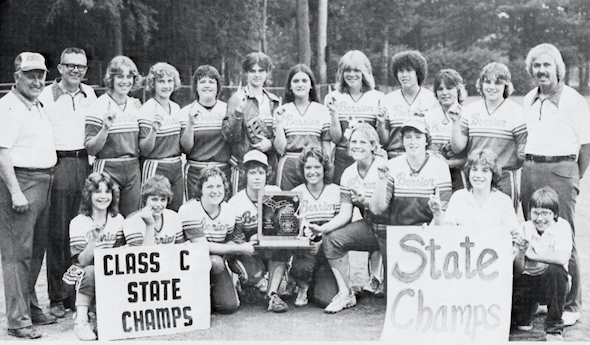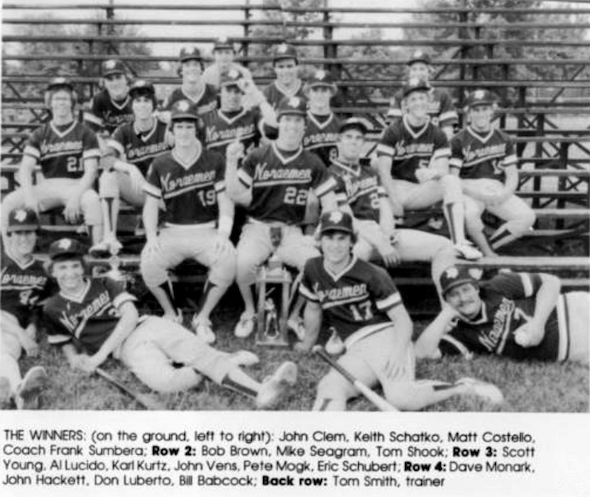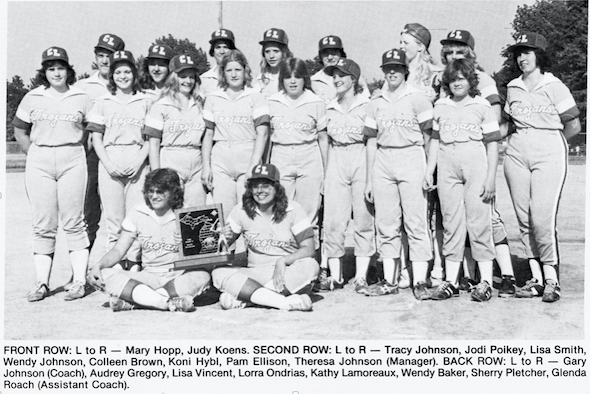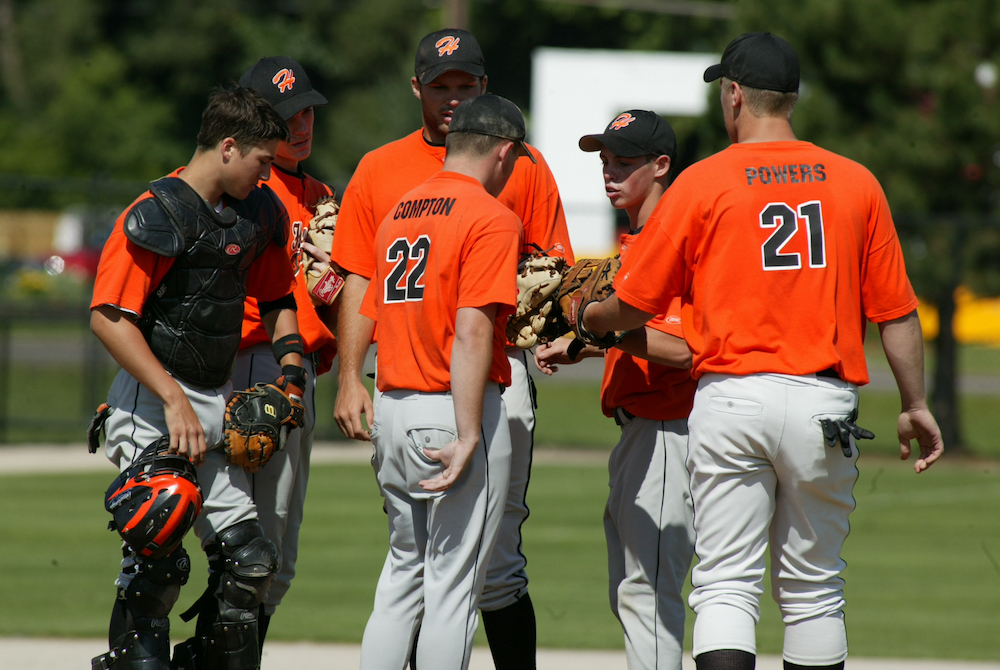
Flashback 1980: Thrilling Conclusions
June 2, 2020
By Ron Pesch
Special for Second Half
With all Spring sports canceled for 2020 because of the COVID-19 pandemic, it’s been a season of recalling fond memories as we all sit and wait for the return of high school athletics in Michigan.
This time we’re diving 40 years deep to the Baseball and Softball Finals from 1980, which saw five of eight championship games decided by two runs or fewer and mostly on late-inning dramatics while played at various parks across the Lower Peninsula.
Here’s a flashback to the 1980 championship rounds:
BASEBALL
A strong argument could be made that Matt Costello’s ninth-inning heroics rank among the top moments in MHSAA tournament history.
In the days when the state Semifinals and Finals were played on the same day, and split across four separate sites spread across the state, an impressive 1,025 fans turned out for the Class A title game between Royal Oak Kimball and Grosse Pointe North, hosted at Wyandotte’s Memorial Park.
For Kimball, it was the fourth appearance in the state title game. The Knights, led by coach Frank Clouser, had appeared in the Class A title game for three straight years, 1971-1973, earning a championship in 1972 with a 3-1 win over Detroit Western.
It was the first appearance in the Finals for North and coach Frank Sumbera. Earlier in the year, the Norsemen had been the top-ranked team in the Michigan High School Baseball Coaches Association Class A poll, but the squad hit a mid-May speedbump. Within five hours, North dropped two games, falling to St. Clair Shores Lakeview, 6-5, then 3-2 to Harper Woods, which was undefeated and ranked No. 1 in Class C. North rebounded, and finished the regular season as the top team in the Class A rankings with a 23-4 mark.
North opened the championship game scoring with three quick runs in the first inning. Kimball made it 3-1 in the bottom half of the inning, then grabbed a 4-3 lead in the third as 6-foot-4 senior Dave Kopf, (a 32nd-round draft pick of the Detroit Tigers one week earlier) crushed a three-run homer. North tied the game at 4-4 in the sixth when junior Bill Babcock led off with a double, moved to third on a sacrifice, then scored when the throw to first base on Keith Schatko’s suicide squeeze bunt went wild. Following a pop out, Costello picked up his first RBI on the day, on a double over the left fielder’s head that scored Schatko, giving North a 5-4 lead.
 Babcock, who had tossed a 2-0 no-hitter earlier in the day in the Norsemen’s Semifinal against Wayne Memorial, replaced starter Tom Shook in the bottom of the sixth inning. Following a walk, Kimball’s Scott Sturley smashed a two-out triple to tie the game, 5-5.
Babcock, who had tossed a 2-0 no-hitter earlier in the day in the Norsemen’s Semifinal against Wayne Memorial, replaced starter Tom Shook in the bottom of the sixth inning. Following a walk, Kimball’s Scott Sturley smashed a two-out triple to tie the game, 5-5.
Neither team could push across a run in the last inning of regulation play. Kimball threatened in the bottom of the eighth, notching a leadoff double. But the danger ended when North catcher Mike Seagram picked off the runner.
Sumbera told Wright Wilson of the Grosse Pointe News that the play was the “turning point of the game.”
Singles by Babcock and Scott Young and a walk by Al Lucido in the top of the ninth inning set the stage for Costello.
“I had Matt swinging away because they were charging their infielders all the time, so we were playing for the hit,” said Sumbera to the Detroit Free Press following the title contest.
“I was just trying to get the run in when I went up there,” stated Costello, who “cracked a 2-2 pitch over the left field fence, more than 365 feet away.”
“When I hit it I knew it was going to be a home run. That was the greatest.”
Costello finished with three hits and an MHSAA championship game-record five RBIs, a mark that stood alone until Jacob Holt from Muskegon Catholic Central tied the record 35 years later, in 2015.
Trailing 9-5, Kimball loaded the bases in the bottom of the ninth inning and scored a run on a two-out wild pitch. But a pop-out to first ended the rally, and North grabbed a 9-6 win and its first diamond title.
Sumbera , who had taken the reins of the North program in 1973, would lead the Norsemen to a second title in 2006. Today, he ranks third in all-time baseball victories in Michigan after a 45-year coaching career.
Flint Powers downed Mount Pleasant 8-7 in a Class B thriller, played at Lansing’s Municipal Park. Mount Pleasant grabbed a 2-0 lead in the bottom of the second inning, before Powers’ Jim Morrissey popped a two-run homer to knot the game in the fourth. The Chargers added two more runs in the top of the fifth, but Mount Pleasant shortstop Bob Lee followed in the bottom of the inning with a two-run shot that tied the game at 4-4.
Powers took a 7-4 lead in the sixth inning and upped the lead to 8-4 on a Mike Morgan bases-loaded single in the seventh. With the game on the line, Mount Pleasant’s Scott Tuma blasted a two-out, three-run homer to cut the margin to 8-7. Morgan, who tossed a five-hit shutout complete game for Powers in its win over Farmington Hills Harrison earlier in the day, allowed two more runners before striking out pinch-hitter Todd Tuma to end the game.
Rain delayed the second Class C Semifinal game and postponed the championship contest until Monday, June 16. Leading 5-0 after three innings, Dundee finished off Lansing Catholic Central 7-2, then topped Parchment 3-1 for its first and only baseball crown. Norm Pentercs, who would later pitch at Grand Valley State, struck out 11 and allowed only four hits in the title game. Those games were played at Broome Park in Flint.
A seventh-inning walk-off bases-loaded single by Scott Trudell broke a 1-1 deadlock to give Grass Lake a 2-1 win over Muskegon Western Michigan Christian in Class D, hosted at Marshall High School. David Knoll allowed just three hits and struck out 13 for the win. It was the second appearance in a Final on the year for WMC, which fell to Detroit East Catholic in an MHSAA basketball championship game in March.
SOFTBALL
Veronica Miller’s single with two outs in the fifth inning drove home Julie Guerra, snapping a 1-1 tie and propelling Flint Carman to a 2-1 victory over East Detroit and all-state pitcher Roxanne ‘Rocky’ Szczesniak in the Class A championship game. Linda Allen picked up her second win on the day. Earlier she tossed a shutout in Carman’s 14-0 victory over Holland West Ottawa. Szczesniak, who would later star at Wayne State, allowed only three hits in the contest after delivering a one-hitter in East Detroit’s 11-3 victory over Ann Arbor Huron in the Semifinal.
“Everything worked great for me today,” Deanne Moore told the Lansing State Journal after tossing a two-hit, 6-0 shutout in Fenton’s Class B Final victory over Grand Rapids Northview. “I knew I had to pitch strikes and my fastball was moving around. I threw a couple of changeups to keep them guessing.”
In the title game, Moore opened the scoring with a solo home run in the second inning. It was followed by a triple by Sandy Thornton, who scored when Theresa Flynn singled up the middle. Moore scored again in the fourth inning following sacrifices by Sue Mora and Flynn, for a 3-0 lead. Northview’s fate was sealed in the fifth as Fenton tallied three more on Thornton’s two-run single and a fielder’s choice by Lori Glass.
It was the third-consecutive Class B title for the Tigers. Moore, a senior righthander, finished with a 24-2 record and would go on to an All-American career at Michigan State, earning entry into MSU’s Hall of Fame in 1996.
Rhonda Thran added her name to the MHSAA Championship Game Record Book, knocking in five runs as Berrien Springs routed Lakeview 11-4 in the Class C title game. Thran matched the RBI record set by DeWitt’s Cindy White in the Panthers’ Class C title victory over Center Line St. Clement in 1977. The sophomore centerfielder, along with second baseman Jan Dowell, was one of two regulars who were also starters on the Shamrocks’ volleyball team that won the Class C championship during the 1979-80 winter sports season.
 Junior Cindy DeFay fired a three-hitter in the championship. “The whole team really wanted this one. I had a good feeling that we were going to win so I was ready to play. It’s the best game I’ve pitched all year,” she told Jack Walkden of the Benton Harbor Herald-Palladium following the game. DeFay had “missed much of the first half of the season with a severely sprained ankle.”
Junior Cindy DeFay fired a three-hitter in the championship. “The whole team really wanted this one. I had a good feeling that we were going to win so I was ready to play. It’s the best game I’ve pitched all year,” she told Jack Walkden of the Benton Harbor Herald-Palladium following the game. DeFay had “missed much of the first half of the season with a severely sprained ankle.”
In the Semifinal, Berrien Springs downed Leroy Pine River 10-8 and banged out 21 hits across the day’s two games, highlighted by five hits by both Rachel Roots and Sheila Duffel, followed with four by Thran.
A police escort guided the team and its retiring coach, Roy Rennhack, back into town after the games played across the state in Oak Park near Detroit – “More than 150 cars joined the caravan, which paraded the team through town atop firetrucks.”
“It was a perfect going away present,” said Rennhack.
It was truly an amazing sports year for the Shamrocks girls, who also won Regional titles in track and basketball. Between 1979 and 1985, Berrien Springs volleyball teams won five Finals volleyball titles. (Those squads were honored in the second year of the MHSAA’s Legends of the Game program in 1999).
In Class D, Central Lake scored a dramatic 2-1 win over Vestaburg. In the top of the seventh inning, Vestaburg had knotted the game at 1-1 before relinquishing a walk to Pam Ellison in the bottom of the inning that set things in motion for the Trojans. Ellison stole second, then advanced to third on a sacrifice by Wendy Johnson. Following a walk to Wendy Baker, catcher Mary Hopp singled Ellison home for the win. Central Lake had finished as state runner-up to Laingsburg in 1978, then fell to Morenci 6-5 in the Semifinals in 1979.
“We were a pretty close-knit team,” said Ellison., recapping the rally.
“I had fantastic kids,” recalled coach Gary Johnson 40 years later. “We played a lot of big-time schools. I never had a second pitcher when I coached. Back then, if you had a girl who could throw a fastball you were at the top of the world. We had Judy Koens.“
Koens allowed just four-hits in the title game and along with Hopp was named to The Associated Press Class D all-state team as Central Lake finished 33-4. Koens would pitch at Central Michigan, posting stellar ERAs during her four seasons and earning all-Mid-American Conference honors in 1984 as a senior.
 Ron Pesch has taken an active role in researching the history of MHSAA events since 1985 and began writing for MHSAA Finals programs in 1986, adding additional features and "flashbacks" in 1992. He inherited the title of MHSAA historian from the late Dick Kishpaugh following the 1993-94 school year, and resides in Muskegon. Contact him at [email protected] with ideas for historical articles.
Ron Pesch has taken an active role in researching the history of MHSAA events since 1985 and began writing for MHSAA Finals programs in 1986, adding additional features and "flashbacks" in 1992. He inherited the title of MHSAA historian from the late Dick Kishpaugh following the 1993-94 school year, and resides in Muskegon. Contact him at [email protected] with ideas for historical articles.
PHOTOS: (Top) Berrien Springs celebrates its 1980 Class C softball championship. (Middle) Grosse Pointe North claims the Class A baseball title in its first Finals under coach Frank Sumbera. (Below) Central Lake improves from Class D softball runner-up in 1978 to champion two years later. (Photos gathered by Ron Pesch.)

St. Mary's Record Run Recalls Homer's 'Small-Town Baseball Odyssey'
By
Geoff Kimmerly
MHSAA.com senior editor
April 21, 2023
As Orchard Lake St. Mary’s celebrated setting the MHSAA record for longest baseball winning streak at 77 and counting over the weekend – and with a national record certainly within reach this season – we can recall just two decades ago when Homer’s similar streak and the two seasons of buzz it stirred was on the verge of its start.
Homer, representing a community of about 1,700 residents, finished 38-0 on the way to winning the Division 3 championship in 2004, and then returned to win its first 37 games of 2005 before falling to Saginaw Nouvel 7-6 in that season’s Division 3 Final at Battle Creek’s C.O. Brown Stadium.
Along the way over those two seasons, the Trojans smashed the previous MHSAA baseball consecutive wins record of 56, and went on to set a national record of 75 straight wins that stood until 2011, when it was surpassed by both Martensdale St. Mary’s of Iowa and Portsmouth, N.H. The latter has topped the national list since 2012 after extending its winning streak into 2012 to the current record of 89 games.
Battle Creek Enquirer reporter Jeff Karzen followed Homer’s record run through many of its most notable moments, and that coverage and the relationships built during that time – and as the Trojans came back to win the Division 4 title in 2006 – led to his first book “Homer: The Small-Town Baseball Odyssey” published in 2011.
Below is an excerpt highlighting the small school’s run to national stardom – followed by updates on a few of the major players who helped the Trojans become unforgettable.
Buy the book here: JeffKarzen.com
***
 Homer: The Small-Town Baseball Odyssey
Homer: The Small-Town Baseball Odyssey
August Publications
Copyright © 2011 Jeff Karzen
All rights reserved
First edition published 2008
Second edition published 2012
Homer began the 2005 season ranked No. 1 in Division 3, a spot it had grabbed and held onto for the second half of ’04. Seven starters returned from a team that had made history with a 38-0 season. Still, Homer had some things to prove to itself.
So far in high school, and even as Little Leaguers, this group of Homer players had been largely defined by Josh Collmenter and Matt Powers. In big postseason games, Collmenter and Powers would take the pressure off their younger teammates and welcome it squarely on their shoulders. Collmenter was always the big-game pitcher. Powers could always be counted on in the middle of the batting order. How would Homer deal without having its two leaders?
“They definitely set the mindset for our team,” Dan Holcomb said of Collmenter and Powers. “When you’re a freshman coming up you don’t really know what varsity is all about or what Homer baseball is all about. You get up there and having those young guys playing against teams like Blissfield is kind of overwhelming. But having guys like Josh and Matt kept you loose and didn’t let you think about Blissfield, or think about seven state titles [won by the Royals]. They just said, ‘Hey guys, let’s have some fun. We’re going out to play some baseball today.’ They just made sure everyone had their mind right.”
Whether it was nerves about following up the unbeaten season with a good showing or an uneasy feeling taking the field without their two leaders, the Trojans began the new season with a close call in a doubleheader against Marshall and its star, Evan Sharpley. Marshall was a good team and a much bigger school, but Homer simply didn’t have it. Somehow, the Trojans escaped with a 14-13 win in eight innings (the most runs it had given up in years) and then a 4-2 triumph in Game Two. With the first two wins under their belt, the Trojans began to roll. Over the next 12 games, they gave up a total of 13 runs, proof that the season opener was nothing more than a fluke. Collmenter and Powers were missing, but junior-dominated Homer began to form its own identity.
The state record for consecutive wins was 56, set by Grand Haven High School from 1960-62. Homer’s Trojans were quickly nearing the record. The streak had reached 49 games when Homer took the short drive west on M-60 for a Big Eight tilt with the Union City Chargers. By now, the other teams in Homer’s conference had basically ruled out beating the powerhouse. Goals such as scoring runs, playing all seven innings without the mercy rule, and even putting the ball in play against Homer’s overpowering pitchers had become the scaled-down aspirations for the opponent.
One rival coach, Quincy’s Brett Allman, didn’t let his team watch Homer’s impressive pregame routine where the Trojan players showed off their big-time throwing arms and precision fielding. “When they warmed up, I talked to my team outside the dugout, or had them hit Wiffle balls or something,” Allman said. “Something besides watch them take infield. They put on a show. And they were proud of the way they took infield, and rightfully so. I don’t need to watch Dusty Compton throw the ball across the infield because I know what they can do. I didn’t think it would be real beneficial for my guys to watch them take infield.”
Under gray, rainy skies in Union City, both teams finished their warm-ups and looked around. Something was missing. It was going to be hard to play this game without any umpires in sight. They waited and waited. Finally, around 5 p.m., 30 minutes after the scheduled start time, one ump arrived. Knowing how much less is seen on the field with only one umpire (regular- season high-school games have two), Salow was hesitant to let the game begin. The lone umpire told both coaches that his partner was on the way, so the coaches acquiesced and allowed the game to start with one set of eyes in charge of the entire field. Union City must’ve forgotten that its opponent that day had won 49 consecutive games. The Chargers came out like they were the team to beat and jumped all over Homer. A few innings into the game, Homer was stunningly down 7-0. “I said to Tom, ‘Not only are we going to lose our streak but we’re going to get 10-runned (a mercy rule loss),’” Salow said.
Of course, Homer started chipping away at the lead. But seven runs was a lot to come back from, even for these Trojans. In the fifth inning, with Homer still trailing by a few runs, C.J. Finch decided it was time to take control of the perilous situation. “Not today! Not today!” Finch screamed. “This is not going to happen today.”
With rain continuing to fall, Homer got within one run in the sixth inning. That’s when the umpire, who worked alone all game, walked over to Homer’s dugout to speak with Salow.
“It’s not looking good, starting to rain harder. Not sure if we’re gonna be able to finish this thing,” the ump told Salow.
“Absolutely not,” the coach fired back. “We started this game 40 minutes late and if we’d started on time, it would be over by now. Not only that, but we have a streak going. These kids have worked too hard to put this streak together and they’re not going to lose it this way.”
The umpire caved in and so did Union City. Homer rallied to win 9-7, extending the winning streak to 50 games. Seven more remained to break the state record that had stood for 44 years.
“I was on pins and needles,” Union City coach Joe Tinervia said of his team’s near-miss. “I was playing that game like it was 1-0. That shows you what I think of Homer.”
A few weeks later, Homer easily topped Concord 10-0 to tie Grand Haven’s state record of 56 straight wins. The stage was set for the talented boys from the one-stoplight town to make history. A Friday doubleheader against Reading, one of the conference’s better teams, would be the record-breaker. It seemed fitting, too, because Reading had handed Homer its last loss in a regional playoff game in 2003. Homer made history in a rather ho-hum affair, winning Game 1 of the doubleheader, 12-2. “It wasn’t breathtaking or staggering or awe-inspiring,” a Battle Creek Enquirer columnist wrote the next day. “But it was efficient. Forgive Homer if it didn’t stage a large celebration for the new record. It’s just that the boys are used to winning.”
“It was just good enough, not flashy,” Salow said after his team won its 57th straight baseball game. “I’d like to think we’re a blue-collar club. It’s the way guys are taught in practice and in the classroom. We try and never get too high or too low.”
***
Where are they now?
- Josh Collmenter pitched in Major League Baseball for seven seasons, the first five-plus for Arizona before finishing his career with Atlanta. He won a career-high 11 games in 2014 and finished his pro career with a 38-35 MLB record. He currently is living in Phoenix and doing radio and TV for Diamondbacks broadcasts.
- Scott Salow left Homer and became superintendent at Petersburg Summerfield in 2021. He coached the Trojans through 2019, building a career record of 577-157.
- Dan Holcomb lives in Nashville, Tenn., and has been a Seattle Mariners scout for six seasons, covering Tennessee, Alabama and Mississippi. He spent six years as a college coach prior to scouting. He pitched collegiately at University of Evansville, Grand Valley State University and Huntingon University (Ind.).
- Dale Cornstubble is married with two kids and living in Homer. He is an electrician and teaches catching lessons on the side. He played at Central Michigan University and was drafted and played briefly in the minor leagues for the Kansas City Royals.
PHOTO Homer players meet on the mound during their 2004 Division 3 Semifinal win over Muskegon Oakridge.

